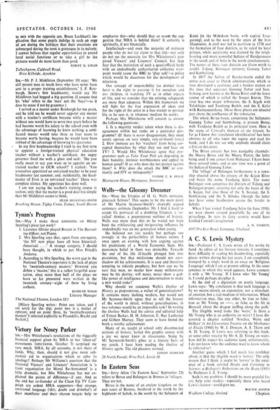Wells—the Gloomy Dreamer SIR,—Were the Utopias of H. G. Wells
insincere, gimcrack fictions? This seems to be the main point of Mr Martin Seymour-Smith's shrewdly argued centenary estimate (September 30). I find it hard to accept his portrayal of a doubting Utopian, a 'so- called' thinker, a preposterous outliner of history. Wells was more than this or he would not have been the exhilarating and invigorating influence he undoubtedly was on my generation when young.
He believed not too weakly but perhaps too strongly in the perfectibility of human nature. I once spent an evening with him arguing against his predictions of a World Economic State. His passionate belief in them was invincible. Towards the end of his life ill-health plunged him into pessimism, but that misfortune should not over- shadow all his achievements. It is easy and therefore tempting to ridicule prophecy, but how can we be sure that man, no matter how many millenniums may be his destiny, will never, never show a god- like power of intelligence and determination to make a new world order?
Why should we condemn Wells's Outline of History as preposterous, a welter of generalisations? It contains many dashing verdicts, but would not Mr Seymour-Smith agree that to tell the history of the world in detail, without generalisations, in two volumes would be an impossible task? In writing the Outline Wells had the advice and editorial help of Ernest Barker, H. H. Johnston, E. Ray Lankester and Gilbert Murray. They seem to have found the book a worthy achievement.
Many of us, taught at school only disconnected sections of history, hailed this graphic survey with a joy we never knew in classrooms. Stung by Mr Seymouth-Smith's gibes at a literary hero of my youth, I have been reading the Outline of History again. The old pleasure revived.






































 Previous page
Previous page